Report on Leadership in the Global Context and Emotional Intelligence
VerifiedAdded on 2023/06/03
|8
|1834
|406
Report
AI Summary
This report delves into the critical role of emotional intelligence (EI) in leadership within a global context. It begins by defining EI and outlining its core factors: self-awareness, managing emotions, self-motivation, empathy, and handling relationships. The report then examines how these factors contribute to leadership effectiveness, highlighting the importance of EI in fostering self-motivated leaders, building strong relationships, and navigating challenging situations. It further discusses the significance of teaching EI, emphasizing its benefits for personal and professional development, and provides insights into methods for convincing individuals of their own EI capabilities. The report concludes by reiterating the importance of EI in shaping effective leaders who can inspire confidence and loyalty, and adapt to the ever-changing demands of the global landscape.

Running head: Leadership in the global context
Leadership in the global context
2018
Leadership in the global context
2018
Paraphrase This Document
Need a fresh take? Get an instant paraphrase of this document with our AI Paraphraser
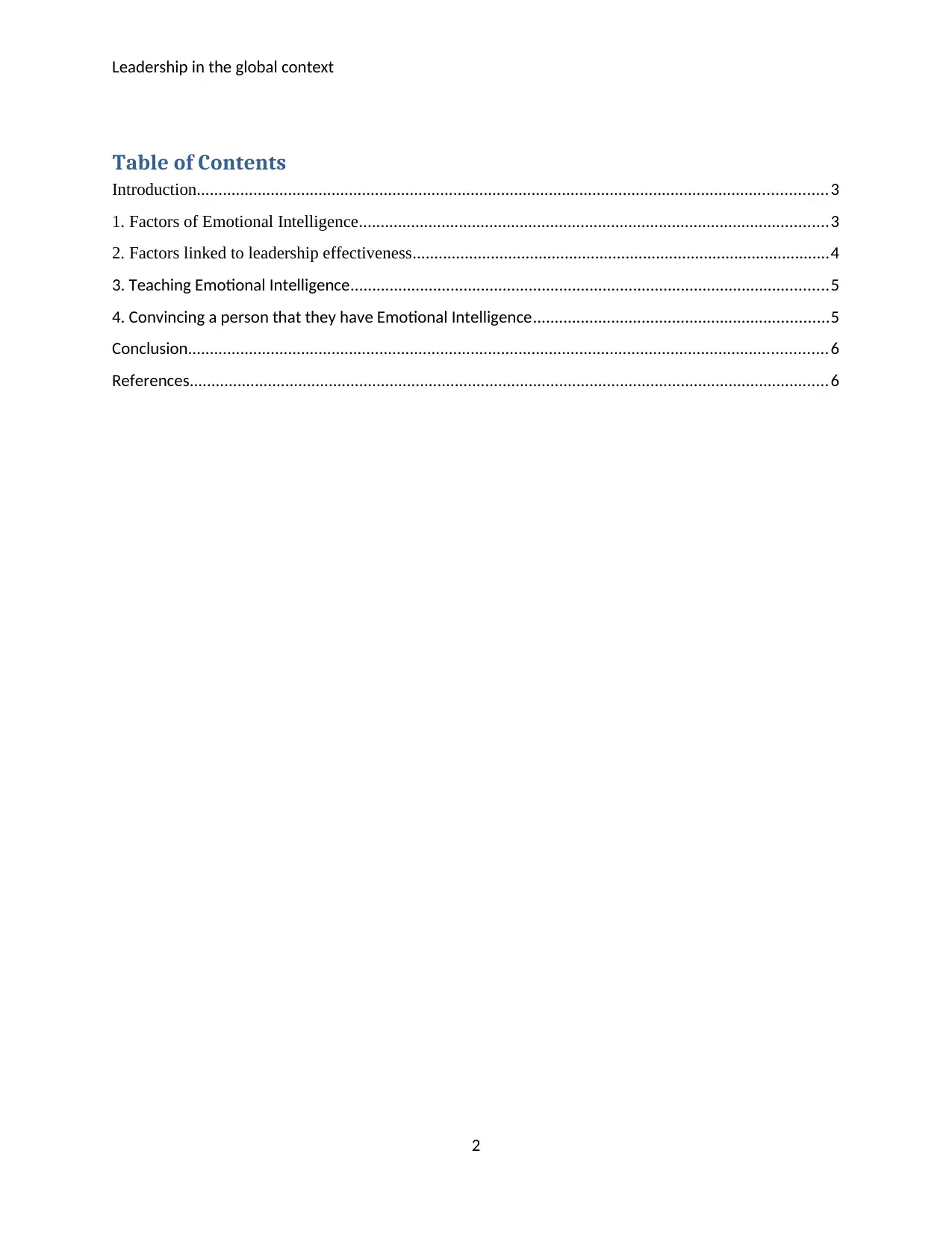
Leadership in the global context
Table of Contents
Introduction.................................................................................................................................................3
1. Factors of Emotional Intelligence............................................................................................................3
2. Factors linked to leadership effectiveness................................................................................................4
3. Teaching Emotional Intelligence..............................................................................................................5
4. Convincing a person that they have Emotional Intelligence....................................................................5
Conclusion...................................................................................................................................................6
References...................................................................................................................................................6
2
Table of Contents
Introduction.................................................................................................................................................3
1. Factors of Emotional Intelligence............................................................................................................3
2. Factors linked to leadership effectiveness................................................................................................4
3. Teaching Emotional Intelligence..............................................................................................................5
4. Convincing a person that they have Emotional Intelligence....................................................................5
Conclusion...................................................................................................................................................6
References...................................................................................................................................................6
2
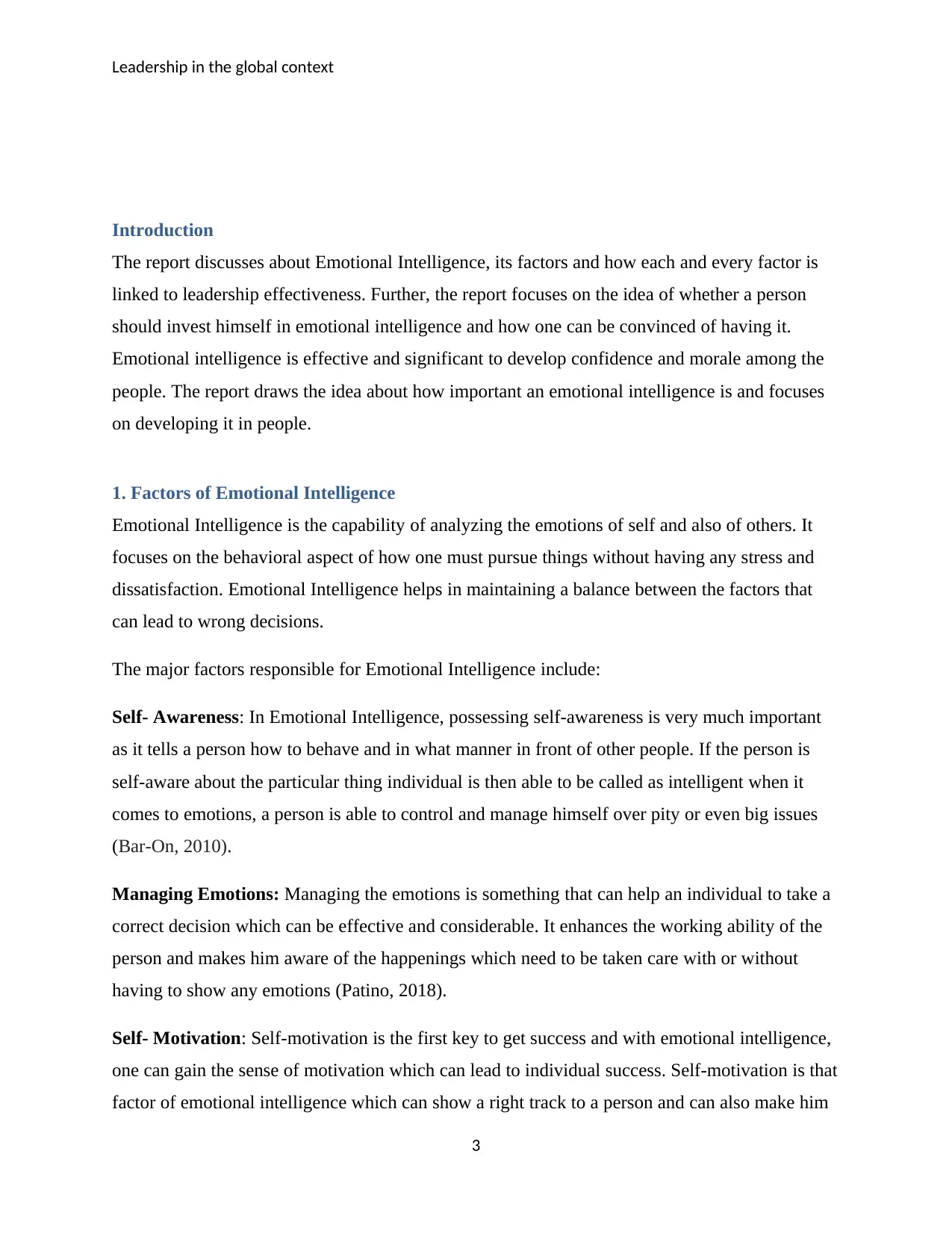
Leadership in the global context
Introduction
The report discusses about Emotional Intelligence, its factors and how each and every factor is
linked to leadership effectiveness. Further, the report focuses on the idea of whether a person
should invest himself in emotional intelligence and how one can be convinced of having it.
Emotional intelligence is effective and significant to develop confidence and morale among the
people. The report draws the idea about how important an emotional intelligence is and focuses
on developing it in people.
1. Factors of Emotional Intelligence
Emotional Intelligence is the capability of analyzing the emotions of self and also of others. It
focuses on the behavioral aspect of how one must pursue things without having any stress and
dissatisfaction. Emotional Intelligence helps in maintaining a balance between the factors that
can lead to wrong decisions.
The major factors responsible for Emotional Intelligence include:
Self- Awareness: In Emotional Intelligence, possessing self-awareness is very much important
as it tells a person how to behave and in what manner in front of other people. If the person is
self-aware about the particular thing individual is then able to be called as intelligent when it
comes to emotions, a person is able to control and manage himself over pity or even big issues
(Bar-On, 2010).
Managing Emotions: Managing the emotions is something that can help an individual to take a
correct decision which can be effective and considerable. It enhances the working ability of the
person and makes him aware of the happenings which need to be taken care with or without
having to show any emotions (Patino, 2018).
Self- Motivation: Self-motivation is the first key to get success and with emotional intelligence,
one can gain the sense of motivation which can lead to individual success. Self-motivation is that
factor of emotional intelligence which can show a right track to a person and can also make him
3
Introduction
The report discusses about Emotional Intelligence, its factors and how each and every factor is
linked to leadership effectiveness. Further, the report focuses on the idea of whether a person
should invest himself in emotional intelligence and how one can be convinced of having it.
Emotional intelligence is effective and significant to develop confidence and morale among the
people. The report draws the idea about how important an emotional intelligence is and focuses
on developing it in people.
1. Factors of Emotional Intelligence
Emotional Intelligence is the capability of analyzing the emotions of self and also of others. It
focuses on the behavioral aspect of how one must pursue things without having any stress and
dissatisfaction. Emotional Intelligence helps in maintaining a balance between the factors that
can lead to wrong decisions.
The major factors responsible for Emotional Intelligence include:
Self- Awareness: In Emotional Intelligence, possessing self-awareness is very much important
as it tells a person how to behave and in what manner in front of other people. If the person is
self-aware about the particular thing individual is then able to be called as intelligent when it
comes to emotions, a person is able to control and manage himself over pity or even big issues
(Bar-On, 2010).
Managing Emotions: Managing the emotions is something that can help an individual to take a
correct decision which can be effective and considerable. It enhances the working ability of the
person and makes him aware of the happenings which need to be taken care with or without
having to show any emotions (Patino, 2018).
Self- Motivation: Self-motivation is the first key to get success and with emotional intelligence,
one can gain the sense of motivation which can lead to individual success. Self-motivation is that
factor of emotional intelligence which can show a right track to a person and can also make him
3
⊘ This is a preview!⊘
Do you want full access?
Subscribe today to unlock all pages.

Trusted by 1+ million students worldwide
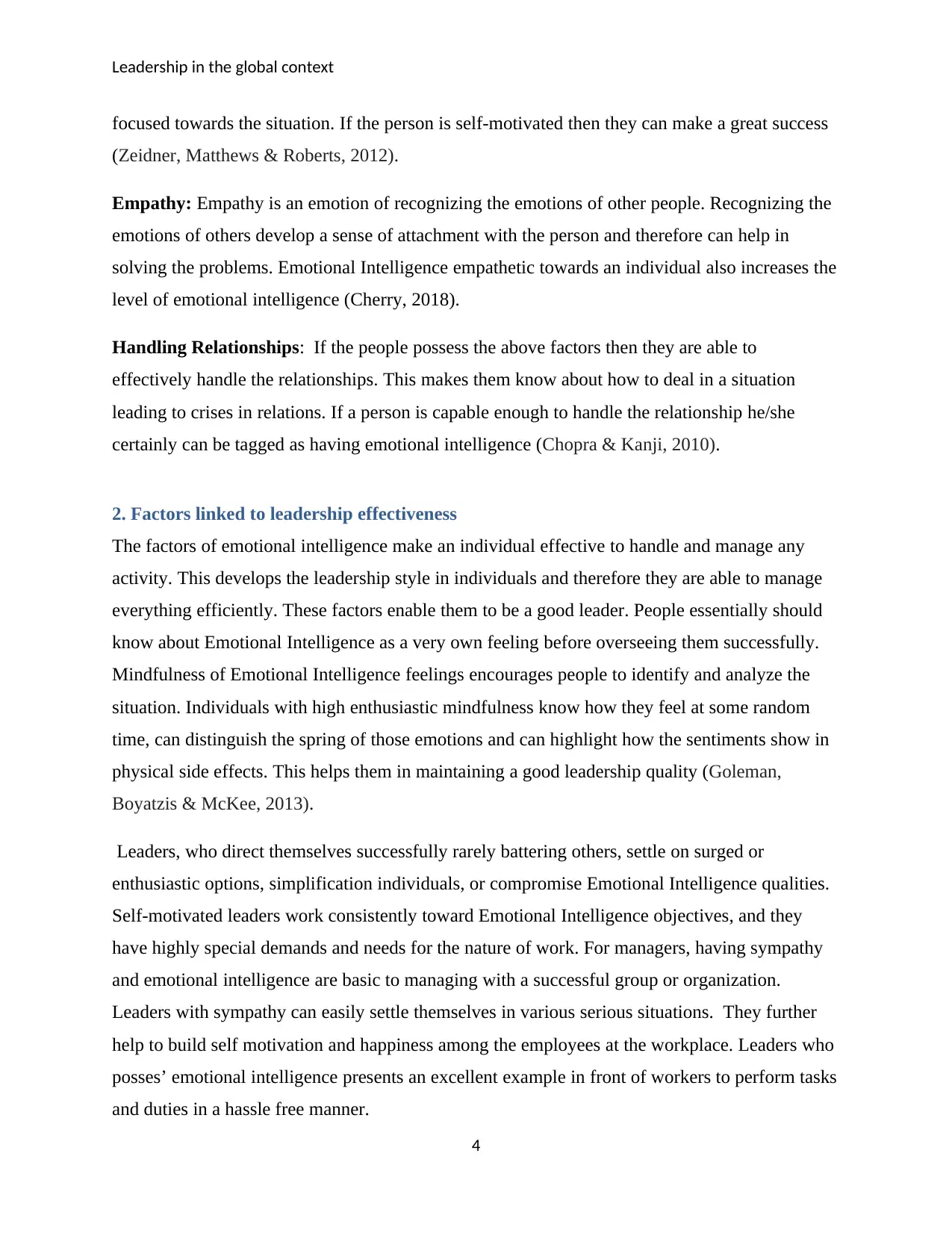
Leadership in the global context
focused towards the situation. If the person is self-motivated then they can make a great success
(Zeidner, Matthews & Roberts, 2012).
Empathy: Empathy is an emotion of recognizing the emotions of other people. Recognizing the
emotions of others develop a sense of attachment with the person and therefore can help in
solving the problems. Emotional Intelligence empathetic towards an individual also increases the
level of emotional intelligence (Cherry, 2018).
Handling Relationships: If the people possess the above factors then they are able to
effectively handle the relationships. This makes them know about how to deal in a situation
leading to crises in relations. If a person is capable enough to handle the relationship he/she
certainly can be tagged as having emotional intelligence (Chopra & Kanji, 2010).
2. Factors linked to leadership effectiveness
The factors of emotional intelligence make an individual effective to handle and manage any
activity. This develops the leadership style in individuals and therefore they are able to manage
everything efficiently. These factors enable them to be a good leader. People essentially should
know about Emotional Intelligence as a very own feeling before overseeing them successfully.
Mindfulness of Emotional Intelligence feelings encourages people to identify and analyze the
situation. Individuals with high enthusiastic mindfulness know how they feel at some random
time, can distinguish the spring of those emotions and can highlight how the sentiments show in
physical side effects. This helps them in maintaining a good leadership quality (Goleman,
Boyatzis & McKee, 2013).
Leaders, who direct themselves successfully rarely battering others, settle on surged or
enthusiastic options, simplification individuals, or compromise Emotional Intelligence qualities.
Self-motivated leaders work consistently toward Emotional Intelligence objectives, and they
have highly special demands and needs for the nature of work. For managers, having sympathy
and emotional intelligence are basic to managing with a successful group or organization.
Leaders with sympathy can easily settle themselves in various serious situations. They further
help to build self motivation and happiness among the employees at the workplace. Leaders who
posses’ emotional intelligence presents an excellent example in front of workers to perform tasks
and duties in a hassle free manner.
4
focused towards the situation. If the person is self-motivated then they can make a great success
(Zeidner, Matthews & Roberts, 2012).
Empathy: Empathy is an emotion of recognizing the emotions of other people. Recognizing the
emotions of others develop a sense of attachment with the person and therefore can help in
solving the problems. Emotional Intelligence empathetic towards an individual also increases the
level of emotional intelligence (Cherry, 2018).
Handling Relationships: If the people possess the above factors then they are able to
effectively handle the relationships. This makes them know about how to deal in a situation
leading to crises in relations. If a person is capable enough to handle the relationship he/she
certainly can be tagged as having emotional intelligence (Chopra & Kanji, 2010).
2. Factors linked to leadership effectiveness
The factors of emotional intelligence make an individual effective to handle and manage any
activity. This develops the leadership style in individuals and therefore they are able to manage
everything efficiently. These factors enable them to be a good leader. People essentially should
know about Emotional Intelligence as a very own feeling before overseeing them successfully.
Mindfulness of Emotional Intelligence feelings encourages people to identify and analyze the
situation. Individuals with high enthusiastic mindfulness know how they feel at some random
time, can distinguish the spring of those emotions and can highlight how the sentiments show in
physical side effects. This helps them in maintaining a good leadership quality (Goleman,
Boyatzis & McKee, 2013).
Leaders, who direct themselves successfully rarely battering others, settle on surged or
enthusiastic options, simplification individuals, or compromise Emotional Intelligence qualities.
Self-motivated leaders work consistently toward Emotional Intelligence objectives, and they
have highly special demands and needs for the nature of work. For managers, having sympathy
and emotional intelligence are basic to managing with a successful group or organization.
Leaders with sympathy can easily settle themselves in various serious situations. They further
help to build self motivation and happiness among the employees at the workplace. Leaders who
posses’ emotional intelligence presents an excellent example in front of workers to perform tasks
and duties in a hassle free manner.
4
Paraphrase This Document
Need a fresh take? Get an instant paraphrase of this document with our AI Paraphraser
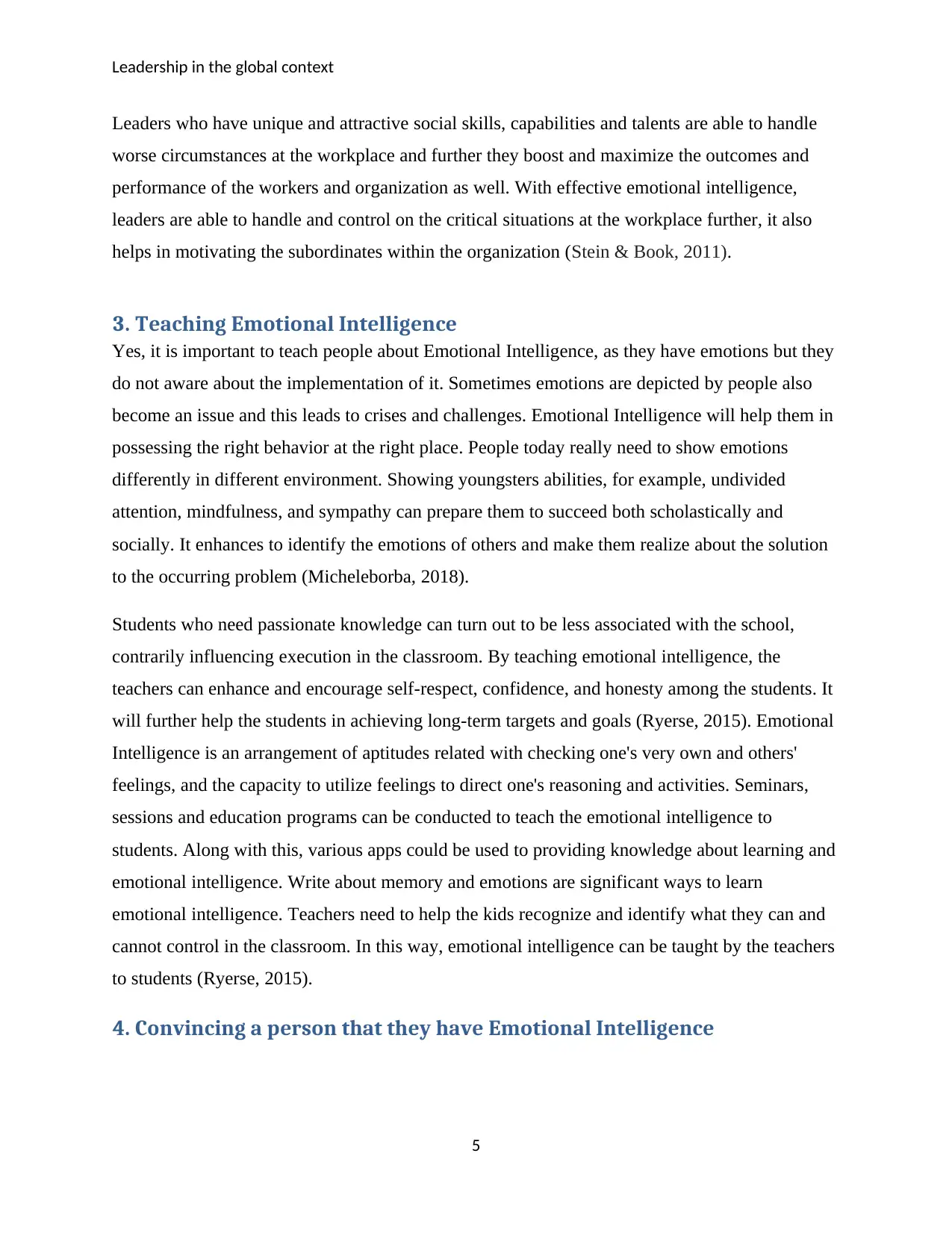
Leadership in the global context
Leaders who have unique and attractive social skills, capabilities and talents are able to handle
worse circumstances at the workplace and further they boost and maximize the outcomes and
performance of the workers and organization as well. With effective emotional intelligence,
leaders are able to handle and control on the critical situations at the workplace further, it also
helps in motivating the subordinates within the organization (Stein & Book, 2011).
3. Teaching Emotional Intelligence
Yes, it is important to teach people about Emotional Intelligence, as they have emotions but they
do not aware about the implementation of it. Sometimes emotions are depicted by people also
become an issue and this leads to crises and challenges. Emotional Intelligence will help them in
possessing the right behavior at the right place. People today really need to show emotions
differently in different environment. Showing youngsters abilities, for example, undivided
attention, mindfulness, and sympathy can prepare them to succeed both scholastically and
socially. It enhances to identify the emotions of others and make them realize about the solution
to the occurring problem (Micheleborba, 2018).
Students who need passionate knowledge can turn out to be less associated with the school,
contrarily influencing execution in the classroom. By teaching emotional intelligence, the
teachers can enhance and encourage self-respect, confidence, and honesty among the students. It
will further help the students in achieving long-term targets and goals (Ryerse, 2015). Emotional
Intelligence is an arrangement of aptitudes related with checking one's very own and others'
feelings, and the capacity to utilize feelings to direct one's reasoning and activities. Seminars,
sessions and education programs can be conducted to teach the emotional intelligence to
students. Along with this, various apps could be used to providing knowledge about learning and
emotional intelligence. Write about memory and emotions are significant ways to learn
emotional intelligence. Teachers need to help the kids recognize and identify what they can and
cannot control in the classroom. In this way, emotional intelligence can be taught by the teachers
to students (Ryerse, 2015).
4. Convincing a person that they have Emotional Intelligence
5
Leaders who have unique and attractive social skills, capabilities and talents are able to handle
worse circumstances at the workplace and further they boost and maximize the outcomes and
performance of the workers and organization as well. With effective emotional intelligence,
leaders are able to handle and control on the critical situations at the workplace further, it also
helps in motivating the subordinates within the organization (Stein & Book, 2011).
3. Teaching Emotional Intelligence
Yes, it is important to teach people about Emotional Intelligence, as they have emotions but they
do not aware about the implementation of it. Sometimes emotions are depicted by people also
become an issue and this leads to crises and challenges. Emotional Intelligence will help them in
possessing the right behavior at the right place. People today really need to show emotions
differently in different environment. Showing youngsters abilities, for example, undivided
attention, mindfulness, and sympathy can prepare them to succeed both scholastically and
socially. It enhances to identify the emotions of others and make them realize about the solution
to the occurring problem (Micheleborba, 2018).
Students who need passionate knowledge can turn out to be less associated with the school,
contrarily influencing execution in the classroom. By teaching emotional intelligence, the
teachers can enhance and encourage self-respect, confidence, and honesty among the students. It
will further help the students in achieving long-term targets and goals (Ryerse, 2015). Emotional
Intelligence is an arrangement of aptitudes related with checking one's very own and others'
feelings, and the capacity to utilize feelings to direct one's reasoning and activities. Seminars,
sessions and education programs can be conducted to teach the emotional intelligence to
students. Along with this, various apps could be used to providing knowledge about learning and
emotional intelligence. Write about memory and emotions are significant ways to learn
emotional intelligence. Teachers need to help the kids recognize and identify what they can and
cannot control in the classroom. In this way, emotional intelligence can be taught by the teachers
to students (Ryerse, 2015).
4. Convincing a person that they have Emotional Intelligence
5
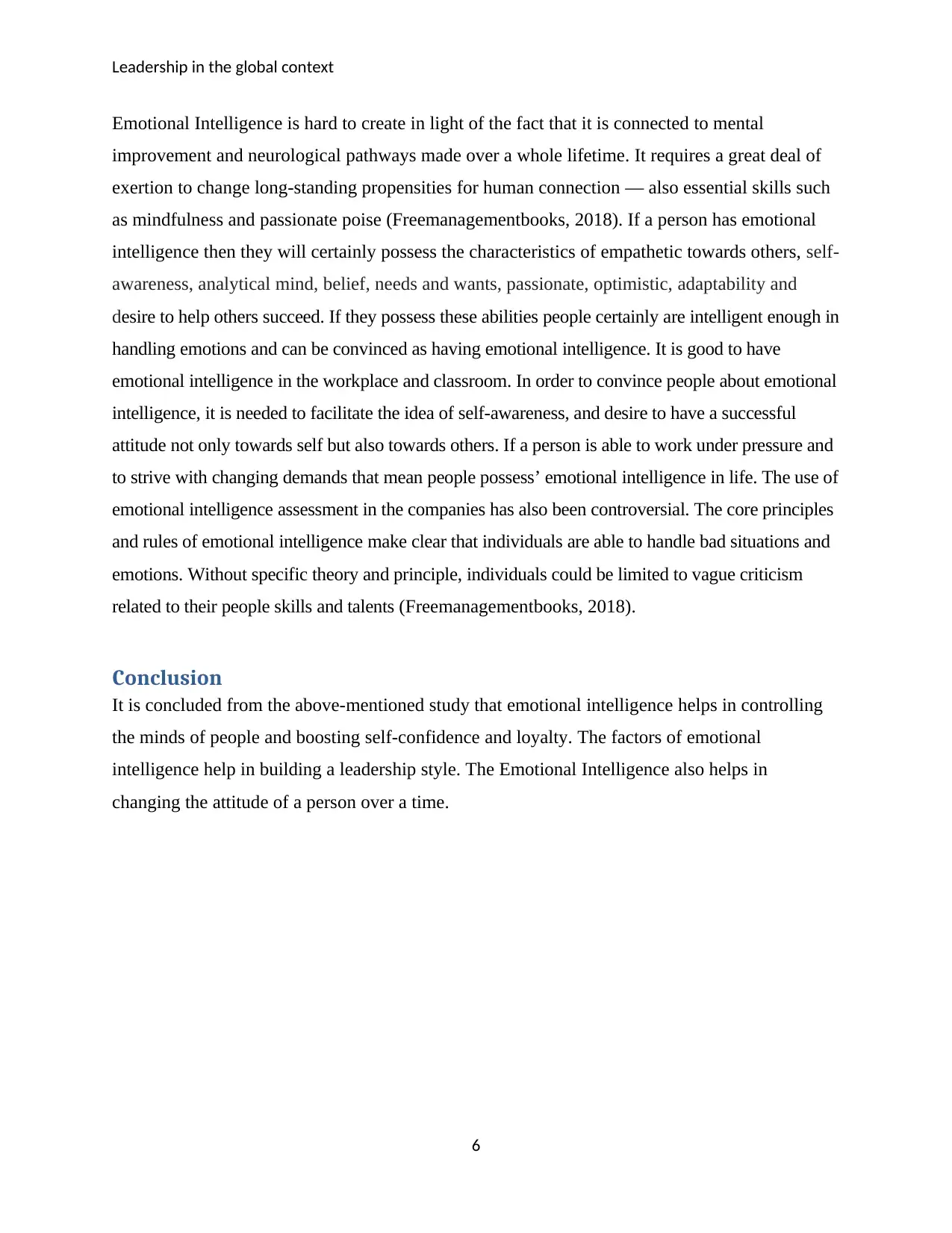
Leadership in the global context
Emotional Intelligence is hard to create in light of the fact that it is connected to mental
improvement and neurological pathways made over a whole lifetime. It requires a great deal of
exertion to change long-standing propensities for human connection — also essential skills such
as mindfulness and passionate poise (Freemanagementbooks, 2018). If a person has emotional
intelligence then they will certainly possess the characteristics of empathetic towards others, self-
awareness, analytical mind, belief, needs and wants, passionate, optimistic, adaptability and
desire to help others succeed. If they possess these abilities people certainly are intelligent enough in
handling emotions and can be convinced as having emotional intelligence. It is good to have
emotional intelligence in the workplace and classroom. In order to convince people about emotional
intelligence, it is needed to facilitate the idea of self-awareness, and desire to have a successful
attitude not only towards self but also towards others. If a person is able to work under pressure and
to strive with changing demands that mean people possess’ emotional intelligence in life. The use of
emotional intelligence assessment in the companies has also been controversial. The core principles
and rules of emotional intelligence make clear that individuals are able to handle bad situations and
emotions. Without specific theory and principle, individuals could be limited to vague criticism
related to their people skills and talents (Freemanagementbooks, 2018).
Conclusion
It is concluded from the above-mentioned study that emotional intelligence helps in controlling
the minds of people and boosting self-confidence and loyalty. The factors of emotional
intelligence help in building a leadership style. The Emotional Intelligence also helps in
changing the attitude of a person over a time.
6
Emotional Intelligence is hard to create in light of the fact that it is connected to mental
improvement and neurological pathways made over a whole lifetime. It requires a great deal of
exertion to change long-standing propensities for human connection — also essential skills such
as mindfulness and passionate poise (Freemanagementbooks, 2018). If a person has emotional
intelligence then they will certainly possess the characteristics of empathetic towards others, self-
awareness, analytical mind, belief, needs and wants, passionate, optimistic, adaptability and
desire to help others succeed. If they possess these abilities people certainly are intelligent enough in
handling emotions and can be convinced as having emotional intelligence. It is good to have
emotional intelligence in the workplace and classroom. In order to convince people about emotional
intelligence, it is needed to facilitate the idea of self-awareness, and desire to have a successful
attitude not only towards self but also towards others. If a person is able to work under pressure and
to strive with changing demands that mean people possess’ emotional intelligence in life. The use of
emotional intelligence assessment in the companies has also been controversial. The core principles
and rules of emotional intelligence make clear that individuals are able to handle bad situations and
emotions. Without specific theory and principle, individuals could be limited to vague criticism
related to their people skills and talents (Freemanagementbooks, 2018).
Conclusion
It is concluded from the above-mentioned study that emotional intelligence helps in controlling
the minds of people and boosting self-confidence and loyalty. The factors of emotional
intelligence help in building a leadership style. The Emotional Intelligence also helps in
changing the attitude of a person over a time.
6
⊘ This is a preview!⊘
Do you want full access?
Subscribe today to unlock all pages.

Trusted by 1+ million students worldwide
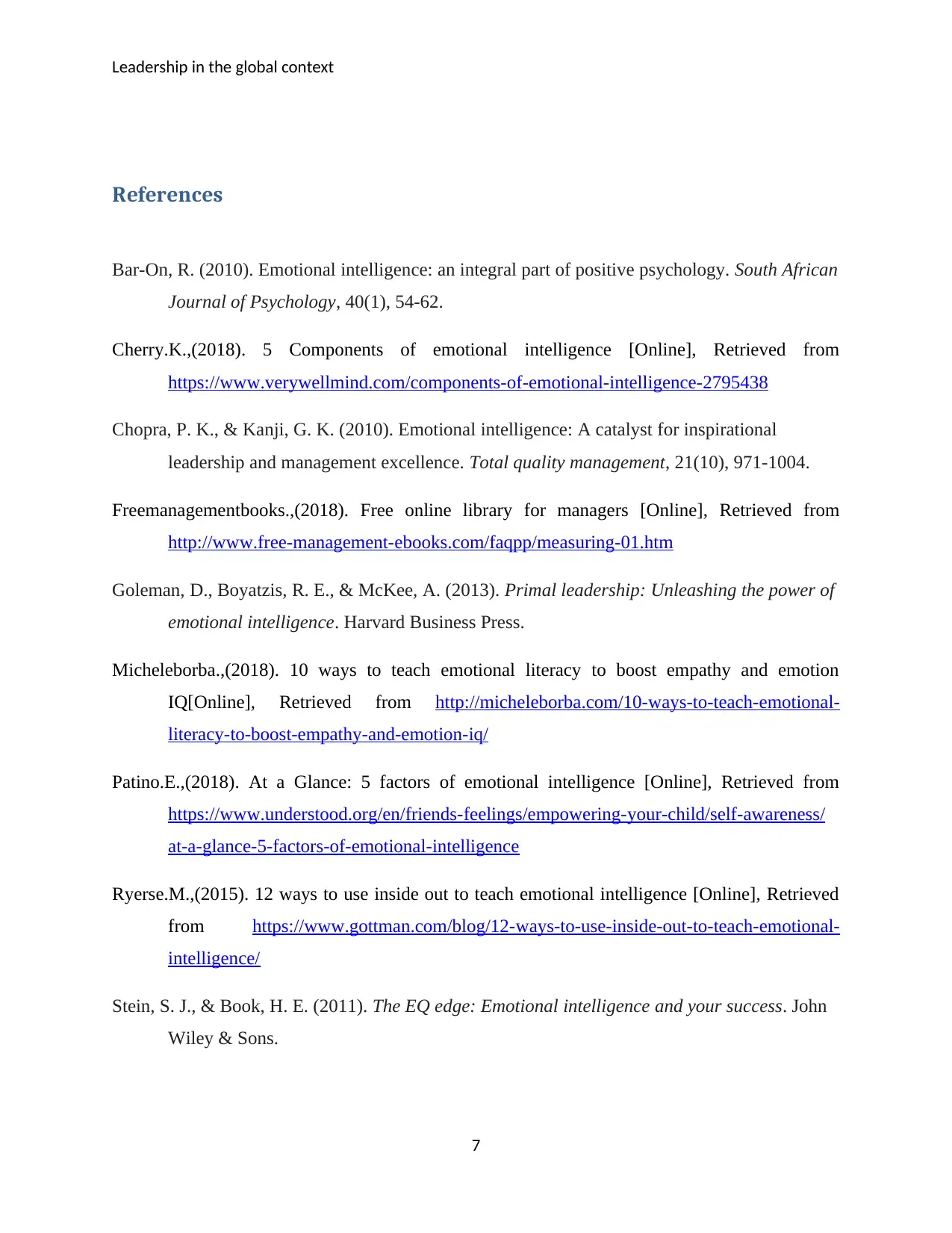
Leadership in the global context
References
Bar-On, R. (2010). Emotional intelligence: an integral part of positive psychology. South African
Journal of Psychology, 40(1), 54-62.
Cherry.K.,(2018). 5 Components of emotional intelligence [Online], Retrieved from
https://www.verywellmind.com/components-of-emotional-intelligence-2795438
Chopra, P. K., & Kanji, G. K. (2010). Emotional intelligence: A catalyst for inspirational
leadership and management excellence. Total quality management, 21(10), 971-1004.
Freemanagementbooks.,(2018). Free online library for managers [Online], Retrieved from
http://www.free-management-ebooks.com/faqpp/measuring-01.htm
Goleman, D., Boyatzis, R. E., & McKee, A. (2013). Primal leadership: Unleashing the power of
emotional intelligence. Harvard Business Press.
Micheleborba.,(2018). 10 ways to teach emotional literacy to boost empathy and emotion
IQ[Online], Retrieved from http://micheleborba.com/10-ways-to-teach-emotional-
literacy-to-boost-empathy-and-emotion-iq/
Patino.E.,(2018). At a Glance: 5 factors of emotional intelligence [Online], Retrieved from
https://www.understood.org/en/friends-feelings/empowering-your-child/self-awareness/
at-a-glance-5-factors-of-emotional-intelligence
Ryerse.M.,(2015). 12 ways to use inside out to teach emotional intelligence [Online], Retrieved
from https://www.gottman.com/blog/12-ways-to-use-inside-out-to-teach-emotional-
intelligence/
Stein, S. J., & Book, H. E. (2011). The EQ edge: Emotional intelligence and your success. John
Wiley & Sons.
7
References
Bar-On, R. (2010). Emotional intelligence: an integral part of positive psychology. South African
Journal of Psychology, 40(1), 54-62.
Cherry.K.,(2018). 5 Components of emotional intelligence [Online], Retrieved from
https://www.verywellmind.com/components-of-emotional-intelligence-2795438
Chopra, P. K., & Kanji, G. K. (2010). Emotional intelligence: A catalyst for inspirational
leadership and management excellence. Total quality management, 21(10), 971-1004.
Freemanagementbooks.,(2018). Free online library for managers [Online], Retrieved from
http://www.free-management-ebooks.com/faqpp/measuring-01.htm
Goleman, D., Boyatzis, R. E., & McKee, A. (2013). Primal leadership: Unleashing the power of
emotional intelligence. Harvard Business Press.
Micheleborba.,(2018). 10 ways to teach emotional literacy to boost empathy and emotion
IQ[Online], Retrieved from http://micheleborba.com/10-ways-to-teach-emotional-
literacy-to-boost-empathy-and-emotion-iq/
Patino.E.,(2018). At a Glance: 5 factors of emotional intelligence [Online], Retrieved from
https://www.understood.org/en/friends-feelings/empowering-your-child/self-awareness/
at-a-glance-5-factors-of-emotional-intelligence
Ryerse.M.,(2015). 12 ways to use inside out to teach emotional intelligence [Online], Retrieved
from https://www.gottman.com/blog/12-ways-to-use-inside-out-to-teach-emotional-
intelligence/
Stein, S. J., & Book, H. E. (2011). The EQ edge: Emotional intelligence and your success. John
Wiley & Sons.
7
Paraphrase This Document
Need a fresh take? Get an instant paraphrase of this document with our AI Paraphraser

Leadership in the global context
Zeidner, M., Matthews, G., & Roberts, R. D. (2012). What we know about emotional
intelligence: How it affects learning, work, relationships, and our mental health. MIT
press.
8
Zeidner, M., Matthews, G., & Roberts, R. D. (2012). What we know about emotional
intelligence: How it affects learning, work, relationships, and our mental health. MIT
press.
8
1 out of 8
Related Documents
Your All-in-One AI-Powered Toolkit for Academic Success.
+13062052269
info@desklib.com
Available 24*7 on WhatsApp / Email
![[object Object]](/_next/static/media/star-bottom.7253800d.svg)
Unlock your academic potential
Copyright © 2020–2026 A2Z Services. All Rights Reserved. Developed and managed by ZUCOL.





